British GP conclusions: Verstappen’s Red Bull exit terms, McLaren’s big test, Hulkenberg’s reward

McLaren driver Lando Norris claimed his fourth victory of the F1 2025 season in the British Grand Prix at Silverstone.
Norris benefited from a penalty for team-mate Oscar Piastri to win his home race for the first time as Sauber driver Nico Hulkenberg finally ended his long wait for an F1 podium. Here are our conclusions from Silverstone…
Lando Norris finally keeps his head as others lose theirsTake a look at Lando Norris’s victories in F1 prior to this weekend and a problem soon catches the eye.
Ignore the final race of 2024 and the first of 2025 (no, they don’t count if they don’t occur in the same season) and before now he had never won two races consecutively.
It was a statistic to sum up the lack of consistency Norris has struggled with since collecting his maiden F1 victory in Miami last year.
How, in hindsight, could he possibly have been expected to hunt down Max Verstappen in last year’s pseudo-title race when he couldn’t even rub two wins together?
And with Oscar Piastri effortlessly reeling off three in a row earlier this season, eliminating all doubt over his title credentials in the process, the thought occurred that Norris would soon struggle to keep up in 2025 without finding some consistency of his own and fast.
That has been the great frustration of Norris over recent years: on his untouchable days (Zandvoort/Abu Dhabi 2024), you are left to wonder how he could ever lose a race again.
Yet when he is at his worst – nervy, edgy, tentative – his potential looks destined to remain unfulfilled.
Oscar Piastri vs Lando Norris: McLaren head-to-head scores for F1 2025👉 F1 2025: Head-to-head qualifying statistics between team-mates
👉 F1 2025: Head-to-head race statistics between team-mates
It is not so much about building momentum, but simply getting into the habit of winning.
It was no coincidence that Verstappen and Red Bull, after so much recent success, have been able to take wins out of the hands of others so routinely over the last 18 months when the likes of McLaren have been gradually re-emerging following years of underachievement.
Winning is very much a sixth sense, one that can only be developed and honed by repetition, repetition, repetition.
Think back to Norris’s victory in Monaco, and it seemed incomprehensible that his performance that weekend – hailed prematurely by the more partisan elements of the British media as a turning point in his season – would not translate to the following race in Spain.
Only for him to be comprehensively beaten by Piastri in Barcelona.
For large sections of this weekend it seemed that Austria/Britain would follow the same pattern, Norris unable to break free from Piastri and Verstappen at Silverstone after blowing everyone away only seven days earlier.
Yet this time, Lando kept his head where even Oscar and Max, the great mentality monsters of modern F1, lost theirs.
There is something to be said for a driver, especially one with a history of losing his composure in high-pressure moments, who makes it through such an emotionally draining race – packed with safety cars, restarts, changeable weather, agonising strategy decisions and multiple pit stops – as the winner by making no errors of note.
Even more so when that race just so happens to be at home with all the expectation, pressure and scrutiny that comes with it.
The contrast with the Norris of Brazil 2024, the day he let the chance of a lifetime trickle away from him over 69 excruciating laps, could not be more stark.
Maybe it really is a very different Lando we’re dealing with now…
Is Oscar Piastri about to pose the first serious test of McLaren’s chummy culture?Can two drivers duelling over the title in the same team ever be friends?
The history of F1, from Prost versus Senna through to Rosberg versus Hamilton, suggests not.
But McLaren, in its wisdom, is going to give it a good go anyway with Oscar Piastri and Lando Norris.
The subject of inter-team harmony came up once again in Friday’s FIA press conference at Silverstone, where Zak Brown reiterated his stance that the McLaren drivers will not allow the combustibility of competition to contaminate their relationship.
Or, as Piastri prefers to put it, “bring the house down” in their efforts to beat each other.
“I think the relationship they have is fantastic,” Brown told media including PlanetF1.com.
“We’ve put a lot of time and effort into building our team and having a chemistry within the team and that starts with the drivers.
“I think you saw how they handled Canada, how they’ve conducted themselves and I see no reason why they can’t have a big battle all the way to the end.
“May the best man win and I’m sure they’ll shake hands and congratulate each other.
“Obviously, both of them want to win but I see no reason why, knowing the personalities and the way they race, that they can’t remain very good team-mates.”
Andrea Stella and Zak Brown: McLaren’s hierarchy in depth👉 Who is Andrea Stella? From Michael Schumacher’s engineer to McLaren team principal
👉 Zak Brown car collection: The legendary machines owned by the McLaren boss
Canada was described by some as the first major flashpoint between the McLaren team-mates in 2025, yet in truth it was a relatively simple matter to deal with in the end.
It helped greatly that the driver who caused the collision also happened to be the one who came off worse, Norris’s apologies to the team and Piastri diffusing the situation at source.
Silverstone? This one has slightly more potential to fester and become an issue further down the line.
It was one thing for Piastri to express his frustration at the stewards over the 10-second penalty he received for driving erratically behind the safety car.
Quite another, it felt, to leave the thought hanging over the team radio airwaves that McLaren might like to consider swapping the cars in the closing laps to give him the win instead.
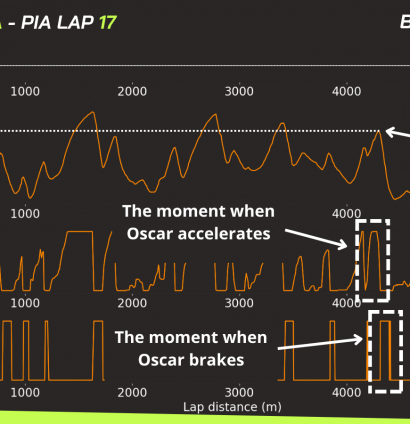
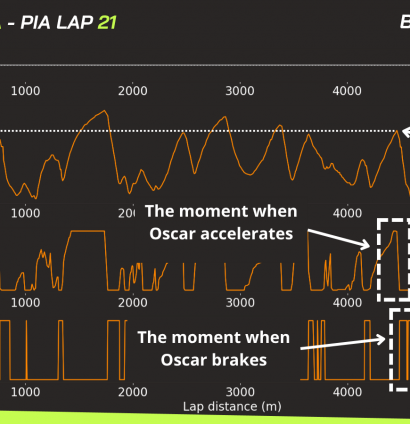
It revealed at least a little resentment that his title rival had benefited, undeservedly in Oscar’s mind, from what Piastri viewed as someone else’s error.
And when that seed of unfairness and injustice – even if misplaced – lodges itself in a driver’s head, it tends to stay there for some time.
Call it competitive paranoia.
Perhaps Piastri will wake up on Monday morning, watch the replays, read the stewards’ verdict, discuss it with the team and come to the same conclusion as pretty much everybody else that his penalty, even if frustrating and the incident totally avoidable, was ultimately fair.
And that radio message?
It would ease things if he acknowledged that it was an unwise, slightly desperate comment made in frustration in the heat of the moment and that we’re all human at the end of the day and that these things sometimes happen.
Unlike Canada, though, this could pose the first serious test of the culture Brown and Andrea Stella have created.
Either McLaren’s management deal with it quickly and take the opportunity to reinforce their principles.
Or the drivers could end up exposing the team’s philosophy, however well intentioned, as wishful thinking.
Nico Hulkenberg’s podium is a reward for Sauber’s transformation under Jonathan WheatleyWhen Jenson Button ended his extended wait for an F1 win at the 2006 Hungarian Grand Prix, the late illustrator Jim Bamber came up with a famous cartoon.
It depicted Button holding the winner’s trophy and peering over his shoulder to find a giant monkey perched on his back.
“Right,” Jenson tells the chimp. “You can f**k off for a start!”
It was somehow fitting that among the first to congratulate Nico Hulkenberg when he stepped out of his Sauber in parc ferme was Button, performing the post-race interviews at Silverstone.
There is a sense of brotherhood between athletes who become famed for underachievement; that shared feeling of being known not for what you are, but for what you are not.
Even in the closing years of his career, standing as a World Champion and winner of 15 races, it was routinely thrown at Button at this time of year that he had never once stood on the podium at his home race. There’s just no pleasing some, eh?
Hulkenberg?
His record of however-many-appearances without a podium had stalked him for more than a decade, leading some of his employers over the years to not cherish him quite as much as they should have done.
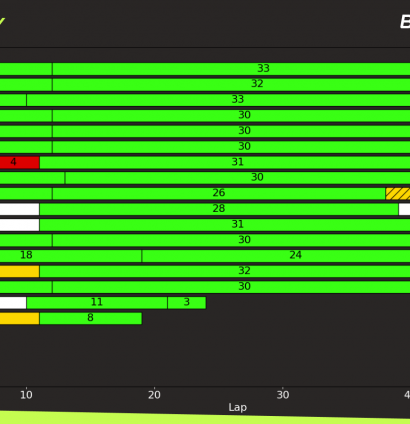
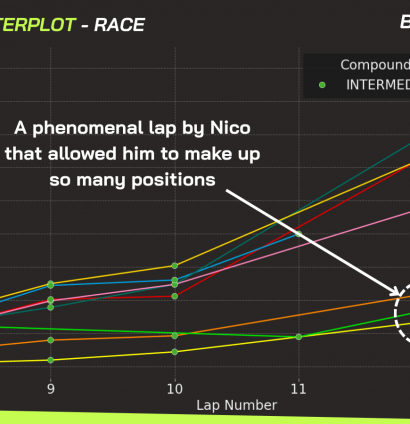
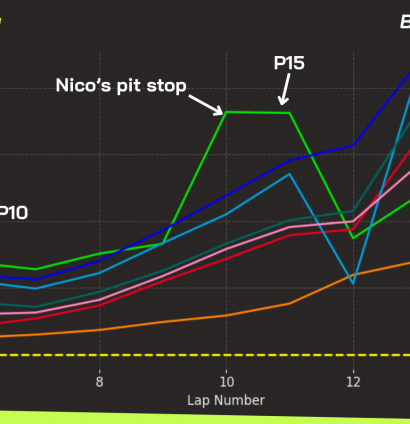
Yet after 239 races without a top-three finish, at last he can tell the monkey on his back exactly where to go too.
And, yes, it may have come in a rain-affected race he started from 19th, but this is not the total fluke it appears at first glance either.
Sauber has been threatening a result like this lately, stretching back to the moment Hulkenberg stole fifth place from Lewis Hamilton’s Ferrari in the closing stages in Spain.
This is what an F1 team is capable of when it has people with motor racing in their bones in charge as opposed to finance-focused, middle-manager types with no feel for which tyres to fit when the rain hits halfway through the British Grand Prix.
It is no coincidence that Sauber has looked totally transformed – the car quicker, the pit stops sharper, the standards higher across the board – since the arrival of Jonathan Wheatley, the former Red Bull sporting director, as its new team principal in April.
Just as James Vowles brought a little bit of Mercedes to Williams, so Wheatley has brought some good, old-fashioned Red Bullness – not to mention some common sense and self-respect – to Sauber.
For the first time since Fred Vasseur’s final season at Sauber in 2022, this looks like a lean, organised, well-drilled race team once again.
And at this rate Hulkenberg’s maiden podium, the most popular result in years, might not prove to be his last.
How lucky Sauber, and Audi, are to have him.
Max Verstappen will leave Red Bull when the team’s usefulness to him expiresWhen the great history of Red Bull’s time in Formula 1 is eventually written, it will be split into two roughly similar volumes.
It will say simply that the team won for four years in a row with one driver and, around a decade later, did it all again with another.
Yet for future generations to think of the Max Verstappen era as some kind of sequel to Sebastian Vettel’s period of dominance would be to disregard the different personalities at play and their relationships with the team.
If Vettel was Red Bull to the core, the team’s favourite son and the academy product made good, Verstappen has always been more of a contractor and his bond with the team more transactional.
You scratch my back, I’ll scratch yours.
It does not make Verstappen’s achievements with Red Bull any less valuable than those of Vettel, but it does make for a small yet significant difference in the dynamic between driver and team.
Far from an accident, it was done totally by design.
When Verstappen was emerging through karting and the junior categories, his father Jos was determined to prevent him from joining – and therefore being at the mercy of – the academy of an F1 team, preferring instead to retain full control of his son’s destiny for as long as possible.
And when the Verstappens finally did submit to Red Bull’s junior scheme in August 2014, an F1 race seat followed almost overnight.
Analysis: Max Verstappen or George Russell? The choice for Mercedes is simple👉 Austrian GP conclusions: Verstappen’s Mercedes guarantee as Russell’s words come back to bite
👉 How Max Verstappen to Mercedes could shake up F1 2026 driver market
The promise of an instant F1 promotion with Toro Rosso for 2015 – something the other interested parties could not offer – was practically the only reason Verstappen opted for Red Bull over Mercedes, the dominant team at that time, and Ferrari.
And if Red Bull had not found a way to fast track Max to the senior team in 2016? And if the team had then failed to deliver on its World Championship potential?
Max, no doubt, would not have thought twice about leaving Red Bull at the drop of a hat and continuing his inevitable, almighty ascent elsewhere instead.
His extraordinary talent has gifted him an inordinate amount of power for a racing driver, uniquely so for one attached to Red Bull.
Much talk over recent weeks has surrounded the nature of Verstappen’s performance-related contract clauses and whether he will meet the criteria required to leave Red Bull for 2026 after the Hungarian Grand Prix later this month.
Yet whatever it says on the piece of paper he signed back in early 2022 is almost immaterial, for Max always has, and always will, determine his own future.
Simply put, he will leave Red Bull when the team’s usefulness to him expires.
It was ever thus.
And based on the team’s competitive decline over the last 12 months, the departures of several important figures and the uncertainty surrounding Red Bull’s prospects under the new regulations for 2026, that moment is approaching fast.
When it finally arrives, he will not hesitate to move on.
Franco Colapinto has Mick Schumacher Syndrome and looks a shadow of his former selfIt was at Monaco in 2022 that Mick Schumacher’s days as a Haas driver were numbered.
His chassis-splitting crash at the Swimming Pool marked his second major accident in the space of six races following his hard hit in Saudi Arabia earlier that season.
And Guenther Steiner, not exactly famed for his emotional intelligence and unable to contain his frustration at seeing yet another car ‘foksmashed’ to pieces, let him have it.
For the first of what would prove many times that season, Steiner was fiercely critical of Schumacher in public, openly raising the possibility of replacing him if the situation continued.
The race straight after Monaco?
Baku. Another street circuit, only with considerably higher speeds and no shortage of things to hit.
It was no great surprise, then, that Schumacher was a shadow of his usual self that weekend.
He was in survival mode, scared stiff of making another mistake and worsening his standing in Steiner’s eyes further still.
His qualifying result? Inevitably last, more than a second slower than his Haas team-mate Kevin Magnussen and with a 0.4s deficit to 19th place for good measure.
There were brighter spots as 2022 developed, yet Monaco/Baku was where the terminal damage to Schumacher’s long-term F1 prospects was done.
It has been a similar feeling watching Franco Colapinto in the races since he replaced Jack Doohan at Alpine after the Miami Grand Prix.
Already with a reputation as a crasher from his cameo with Williams last season, his accident in qualifying at his first race back at Imola was his Monaco 2022 moment.
With Flavio Briatore’s three golden rules – be fast, don’t crash, score points – ringing in his ears, Colapinto has been suffering from Mick Schumacher Syndrome ever since.
Could he refine his reactive, reflex-heavy technique and tone down his aggressive instincts to emerge a quick and reliable points scorer?
Or would the growing necessity to keep it out of the barriers come at the cost of performance?
That was the conundrum upon which the success of Colapinto’s mid-2025 comeback was always going to hinge.
He has been struggling to find the right balance, incapable of pushing a tricky Alpine without making mistakes yet pitifully slow without the stimulation of dancing constantly on that fine line between triumph and disaster.
His unhelpfully short initial contract, now replaced by an even more precipitous race-by-race deal, has only served to strangle whatever potential he had when he stepped into that seat.
And with no guarantees that he will make it to the next race, he is rapidly running out of time to find a cure.
Read next: Has Max Verstappen already made up his mind about his Red Bull F1 future?
planetf1.com





